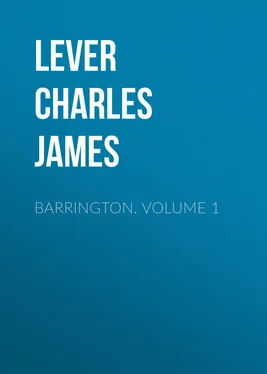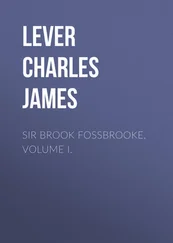Charles Lever - Barrington. Volume 1
Здесь есть возможность читать онлайн «Charles Lever - Barrington. Volume 1» — ознакомительный отрывок электронной книги совершенно бесплатно, а после прочтения отрывка купить полную версию. В некоторых случаях можно слушать аудио, скачать через торрент в формате fb2 и присутствует краткое содержание. Жанр: literature_19, foreign_antique, foreign_prose, на английском языке. Описание произведения, (предисловие) а так же отзывы посетителей доступны на портале библиотеки ЛибКат.
- Название:Barrington. Volume 1
- Автор:
- Жанр:
- Год:неизвестен
- ISBN:нет данных
- Рейтинг книги:5 / 5. Голосов: 1
-
Избранное:Добавить в избранное
- Отзывы:
-
Ваша оценка:
- 100
- 1
- 2
- 3
- 4
- 5
Barrington. Volume 1: краткое содержание, описание и аннотация
Предлагаем к чтению аннотацию, описание, краткое содержание или предисловие (зависит от того, что написал сам автор книги «Barrington. Volume 1»). Если вы не нашли необходимую информацию о книге — напишите в комментариях, мы постараемся отыскать её.
Barrington. Volume 1 — читать онлайн ознакомительный отрывок
Ниже представлен текст книги, разбитый по страницам. Система сохранения места последней прочитанной страницы, позволяет с удобством читать онлайн бесплатно книгу «Barrington. Volume 1», без необходимости каждый раз заново искать на чём Вы остановились. Поставьте закладку, и сможете в любой момент перейти на страницу, на которой закончили чтение.
Интервал:
Закладка:
For many a year back he had ceased to follow the great events of the world. For the stupendous changes in Europe he cared next to nothing. He scarcely knew who reigned over this empire or that kingdom. Indifferent to art, science, letters, and even society, his interest was intense about all that went on in the law courts, and it was an interest so catholic that it took in everything and everybody, from the great judge upon the bench to the small taxing-officer who nibbled at the bill of costs.
Fortunately for him, his sister, a maiden lady of some eighteen or twenty years his junior, had imbibed nothing of this passion, and, by her prudent opposition to it, stemmed at least the force of that current which was bearing him to ruin. Miss Dinah Barrington had been the great belle of the Irish court, – I am ashamed to say how long ago, – and though at the period my tale opens there was not much to revive the impression, her high nose, and full blue eyes, and a mass of wonderfully unchanged brown hair, proclaimed her to be – what she was very proud to call herself – a thorough Barrington, a strong type of a frank nature, with a bold, resolute will, and a very womanly heart beneath it.
When their reverses of fortune first befell them, Miss Barrington wished to emigrate. She thought that in Canada, or some other far-away land, their altered condition might be borne less painfully, and that they could more easily bend themselves to humble offices where none but strangers were to look on them; but Barrington clung to his country with the tenacity of an old captain to a wreck. He declared he could not bring himself to the thought of leaving his bones in a strange land, but he never confessed what he felt to be the strongest tie of all, two unfinished lawsuits, the old record of Barrington v. Brazier, and a Privy Council case of Barrington and Lot Rammadahn Mohr against the India Company. To have left his country with these still undecided seemed to him – like the act of a commander taking flight on the morning of a general action – an amount of cowardice he could not contemplate. Not that he confided this opinion to his sister, though he did so in the very fullest manner to his old follower and servant, Darby Cassan. Darby was the last remnant of a once princely retinue, and in his master’s choice of him to accompany his fallen fortunes, there was something strangely indicative of the man. Had Darby been an old butler or a body-servant, had he been a favorite groom, or, in some other capacity, one whose daily duties had made his a familiar face, and whose functions could still be available in an humble state, there would have seemed good reason for the selection; but Darby was none of these: he had never served in hall or pantry; he had never brushed the cobweb from a bottle, or led a nag to the door. Of all human professions his were about the last that could address themselves to the cares of a little household; for Darby was reared, bred, and passed fifty-odd years of his life as an earth-stopper!
A very ingenious German writer has attempted to show that the sympathies of the humble classes with pursuits far above their own has always its origin in something of their daily life and habits, just as the sacristan of a cathedral comes to be occasionally a tolerable art critic from his continual reference to Rubens and Vandyck. It is possible that Darby may have illustrated the theory, and that his avocations as earth-stopper may have suggested what he assuredly possessed, a perfect passion for law. If a suit was a great game to Barrington, to Darby it was a hunt! and though his personal experiences never soared beyond Quarter Sessions, he gloried in all he saw there of violence and altercation, of vituperative language and impassioned abuse. Had he been a rich man, free to enjoy his leisure, he would have passed all his days listening to these hot discussions. They were to him a sort of intellectual bull-fight, which never could be too bloody or too cruel. Have I said enough, therefore, to show the secret link which bound the master to the man? I hope so; and that my reader is proud of a confidence with which Miss Barrington herself was never intrusted. She believed that Darby had been taken into favor from some marvellous ability he was supposed to possess, applicable to their new venture as innkeepers. Phrenology would perhaps have pronounced Darby a heaven-born host, for his organ of acquisitiveness was grandly developed. Amidst that great household, where the thriftless habits of the master had descended to the servants, and rendered all reckless and wasteful alike, Darby had thriven and grown almost rich. Was it that the Irish climate used its influence over him; for in his practice to “put by something for a rainy day,” his savings had many promptings? As the reputation of having money soon attached to him, he was often applied to in the hunting-field, or at the kennel, for small loans, by the young bloods who frequented the Hall, and, being always repaid three or four fold, he grew to have a very high conception of what banking must be when done on a large scale. Besides all this, he quickly learned that no character attracts more sympathy, especially amongst the class of young squires and sporting-men, than a certain quaint simplicity, so flattering in its contrast to their own consummate acuteness. Now, he was simple to their hearts’ content. He usually spoke of himself as “Poor Darby, God help him!” and, in casting up those wonderful accounts, which he kept by notches on a tally-stick, nothing was more amusing than to witness his bewilderment and confusion, the inconceivable blunders he would make, even to his own disadvantage, all sure to end at last in the heart-spoken confession that it was “clean beyand him,” and “he ‘d leave it all to your honor; pay just what ye plaze, and long life to ye!”
Is it that women have some shrewd perception of character denied to men? Certainly Darby never imposed on Miss Barrington. She read him like a book, and he felt it. The consequence was a very cordial dislike, which strengthened with every year of their acquaintance.
Though Miss Barrington ever believed that the notion of keeping an inn originated with her brother, it was Darby first conceived the project, and, indeed, by his own skill and crafty intelligence was it carried on; and while the words “Peter Barrington” figured in very small letters, it is true, over the door to comply with a legal necessity, to most of the visitors he was a mere myth. Now, if Peter Barrington was very happy to be represented by deputy, – or, better still, not represented at all, – Miss Dinah regarded the matter in a very different light. Her theory was that, in accepting the humble station to which reverse of fortune brought them, the world ought to see all the heroism and courage of the sacrifice. She insisted on being a foreground figure, just to show them, as she said, “that I take nothing upon me. I am the hostess of a little wayside inn, – no more!” How little did she know of her own heart, and how far was she from even suspecting that it was the ci-devant belle making one last throw for the admiration and homage which once were offered her freely.
Such were the three chief personages who dwelt under that secluded roof, half overgrown with honeysuckle and dog-roses, – specimens of that wider world without, where jealousies, and distrusts, and petty rivalries are warring: for as in one tiny globule of water are represented the elements which make oceans and seas, so is it in the moral world; and “the family” is only humanity, as the artists say, “reduced.”
For years back Miss Barrington had been plotting to depose Darby. With an ingenuity quite feminine, she managed to connect him with every chagrin that crossed and every annoyance that befell them. If the pig ploughed up the new peas in the garden, it was Darby had left the gate open; it was his hand overwound the clock; and a very significant hint showed that when the thunder soured the beer, Mr. Darby knew more of the matter than he was likely to tell. Against such charges as these, iterated and reiterated to satiety, Barrington would reply by a smile, or a good-natured excuse, or a mere gesture to suggest patience, till his sister, fairly worn out, resolved on another line of action. “As she could not banish the rats,” to use her own words, “she would scuttle the ship.”
Читать дальшеИнтервал:
Закладка:
Похожие книги на «Barrington. Volume 1»
Представляем Вашему вниманию похожие книги на «Barrington. Volume 1» списком для выбора. Мы отобрали схожую по названию и смыслу литературу в надежде предоставить читателям больше вариантов отыскать новые, интересные, ещё непрочитанные произведения.
Обсуждение, отзывы о книге «Barrington. Volume 1» и просто собственные мнения читателей. Оставьте ваши комментарии, напишите, что Вы думаете о произведении, его смысле или главных героях. Укажите что конкретно понравилось, а что нет, и почему Вы так считаете.












